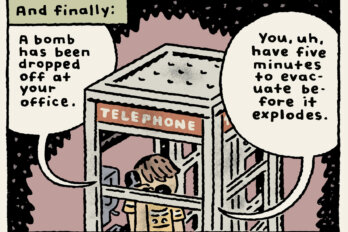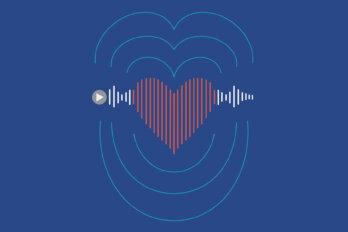The period of the period has come to an end. The sentence-ending punctuation mark is, it seems, poised to go the way of the interrobang (‽) and the hedera (❧). “Period. Full Stop. Point. Whatever It’s Called, It’s Going Out of Style,” declares an article in the New York Times from last month. What is it that has dealt the traditional dot a killing blow? Millennials and their texting, of course.
Millennials don’t call their friends on their phones to chat about Taylor Swift and Tom Hiddleston; they don’t email each other when Taylor Swift and Tom Hiddleston have been spotted looking dapper and windblown on a beach. No—they simply text “Hiddleswift 4ever” on their smartphones before trying to figure out which emoji best communicates their fear that they’ll never be financially secure enough to purchase property. Texting has been blamed for ruining the grammar and vocabulary of the young and for putting various kinds of punctuation (the apostrophe, the hyphen) on life support. And now the Grey Lady has added the period to the endangered species list, saying, “one of the oldest forms of punctuation may be dying.”
The article bases this claim on the fact that they aren’t being used much in text messages. Each text stands as a single unit of communication, so it’s not necessary to end each sentence with a period in order to signal that the sentence has indeed ended. When a period is included, researchers have found, young people tend to read it as signifying irritation, sarcasm, or combativeness.
“What day is it?”
“Wednesday” (That was a reasonable question, and I do not judge you.)
“What day is it?”
“Wednesday.” (You utter fool. I judge you a great deal, and negatively.)
But before you start wringing your hands over the peculiar and probably pernicious habits of the young and composing a heartfelt eulogy for the period, remember that texting is by no means the first mode of technology-based communication to have developed its own set of rules and idiosyncrasies—without destroying, deforming, or otherwise damaging written English as a whole.
“Success four flights Thursday morning all against twenty one mile wind started from level with engine power alone average speed through air thirty one miles longest 57 seconds inform Press home Christmas.”
What entitled teenager, ignorant of grammar and punctuation and acceptable sentence structure, created this incoherent message? Why, it was none other than thirty-two-year-old Orville Wright, breathlessly announcing to his father on December 17, 1903, that he and his brother had managed to keep a flying machine in the air for almost a minute. He was sharing the news via telegram, which meant every word came at a cost and it was to his benefit to cut out any extraneous content.
Although such writers as Ernest Hemingway and Rudyard Kipling credited the restrictions of “cablese” with honing their prose and teaching them restraint, the curt, jerky, staccato style of the telegram did not seep into and then completely transform other areas of writing and speaking. As Steven Pinker notes in The Sense of Style (2014), “ . . . contrary to an urban legend, [college students] do not sprinkle their papers with smileys and instant-messaging abbreviations like IMHO and L8TR, any more than previous generations forgot how to use prepositions and articles out of the habit of omitting them from their telegrams.”
Although I searched diligently, I could find no examples of apocalyptic, telegram-related language hysteria (“Will today’s bobby soxers be tomorrow’s illiterates? How telegrams are making our children stupider”). That could be because telegrams were associated more with grown-ups and businesspeople and politicians than with teenagers. Grown-ups can get away with creating PowerPoint bullets along the lines of “Our unit was empowered to operationalize many learnings after it leveraged the synergies” without becoming front-page news (“Is corporate jargon sounding the death knell of capitalism? Why the PowerPoint paradigm might shift our thinking outside the box and right off a cliff”).
But when the younger generation, the one not usually responsible for writing language-related thinkpieces, adopts a new communication technique, certain extreme reactions are common. English will soon be unrecognizable! These reasonably new humans don’t even use periods! What this argument fails to recognize is that texting is its own separate medium and that millennials are capable of understanding that different media operate according to different conventions. Twenty-year-olds who would interpret a full stop as a passive-aggressive rebuke when confronted by one on their phones would almost certainly use them in essays. Or emails. Or all the other forms of written communication that existed before text messaging. Indeed, when university researchers asked a group of undergraduates to look at texts and handwritten notes—some of which contained periods and some of which did not—the students found the period-punctuated texts “less sincere,” but made no such distinction in the case of the notes.
These students experienced the period’s effect in texts and notes differently because they are aware that texts and notes are not the same thing. We may well be living in a time of “OMG 4 flights Thurs am longest 57 secs FFS tell media we R famous LOL #WrightBros,” but I don’t expect written English to become point-less anytime soon.





